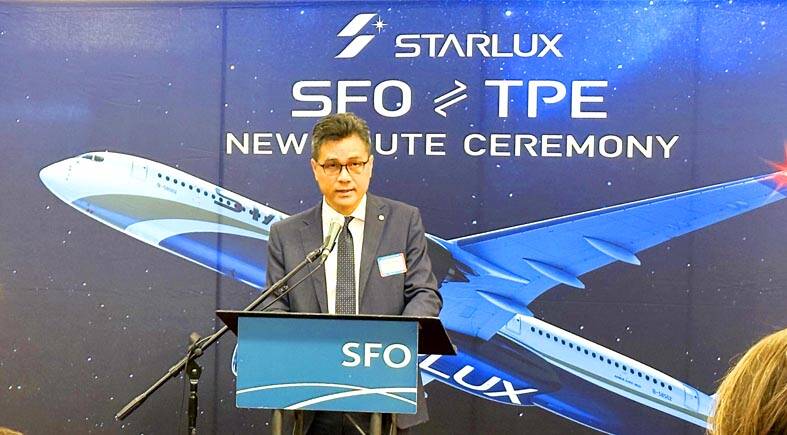Starlux Airlines Co (星宇航空) is to lease six A321neo aircraft as it eyes expansion amid a tourism boom.
The airline plans to spend about NT$2.16 billion (US$67.51 million) on each of the first three planes, which would be leased from GY Aviation Lease 2405 Co, Starlux said in a statement.
The price of the other three planes is still being negotiated and would be disclosed after an agreement is signed, it said.

Photo: CNA
A Starlux prospectus posted in June on the Taiwan Stock Exchange said that as of the end of May, the airline had a fleet of 22 passenger planes — 13 A321neos, five A350-900s and four A330neos.
The airline is expected to take delivery of an additional five planes by the end of this year to boost its fleet to 27, the prospectus said.
The airline would introduce its first A350-1000 aircraft next year to serve long-haul routes to the US, it said.
Starlux launched direct flights between Taipei and Seattle on Friday. The airline also flies to Los Angeles and San Francisco in the US, which are among more than 20 destinations overall, including Vietnam, the Philippines, Malaysia, Singapore, Thailand, Japan and Hong Kong.
On Oct. 27, the airline is to launch daily flights between Taichung and Phu Quoc Island in Vietnam on its A321neo planes.
Next month, it is to begin five weekly flights between Taipei and Jakarta, also on the A321neos.
With a resurgence in tourism following the end of COVID-19 restrictions, Starlux posted NT$900 million in net profit in the first half of this year, up 172 percent from a year earlier. Earnings per share were NT$0.39 in the period, up NT$0.21 from a year earlier.
The carrier’s consolidated sales for the first six months surged 65 percent from a year earlier to NT$16.33 billion.
Last month, Starlux posted NT$3.47 billion in consolidated sales, up 53 percent from a year earlier and 13 percent from a month earlier to set a new high for the month.
Revenue from its passenger flight operations was about NT$3.03 billion last month and the company posted NT$301 million in sales from its cargo flights, up 122 percent from a year earlier, largely due to demand for transportation of gadgets related to an artificial intelligence boom.
At an annual meeting in June, Starlux chairman Chang Kuo-wei (張國煒) said that the carrier aimed to eliminate its cumulative losses of more than NT$11.5 billion in three years.

MULTIFACETED: A task force has analyzed possible scenarios and created responses to assist domestic industries in dealing with US tariffs, the economics minister said The Executive Yuan is tomorrow to announce countermeasures to US President Donald Trump’s planned reciprocal tariffs, although the details of the plan would not be made public until Monday next week, Minister of Economic Affairs J.W. Kuo (郭智輝) said yesterday. The Cabinet established an economic and trade task force in November last year to deal with US trade and tariff related issues, Kuo told reporters outside the legislature in Taipei. The task force has been analyzing and evaluating all kinds of scenarios to identify suitable responses and determine how best to assist domestic industries in managing the effects of Trump’s tariffs, he

TIGHT-LIPPED: UMC said it had no merger plans at the moment, after Nikkei Asia reported that the firm and GlobalFoundries were considering restarting merger talks United Microelectronics Corp (UMC, 聯電), the world’s No. 4 contract chipmaker, yesterday launched a new US$5 billion 12-inch chip factory in Singapore as part of its latest effort to diversify its manufacturing footprint amid growing geopolitical risks. The new factory, adjacent to UMC’s existing Singapore fab in the Pasir Res Wafer Fab Park, is scheduled to enter volume production next year, utilizing mature 22-nanometer and 28-nanometer process technologies, UMC said in a statement. The company plans to invest US$5 billion during the first phase of the new fab, which would have an installed capacity of 30,000 12-inch wafers per month, it said. The

Taiwan’s official purchasing managers’ index (PMI) last month rose 0.2 percentage points to 54.2, in a second consecutive month of expansion, thanks to front-loading demand intended to avoid potential US tariff hikes, the Chung-Hua Institution for Economic Research (CIER, 中華經濟研究院) said yesterday. While short-term demand appeared robust, uncertainties rose due to US President Donald Trump’s unpredictable trade policy, CIER president Lien Hsien-ming (連賢明) told a news conference in Taipei. Taiwan’s economy this year would be characterized by high-level fluctuations and the volatility would be wilder than most expect, Lien said Demand for electronics, particularly semiconductors, continues to benefit from US technology giants’ effort

‘SWASTICAR’: Tesla CEO Elon Musk’s close association with Donald Trump has prompted opponents to brand him a ‘Nazi’ and resulted in a dramatic drop in sales Demonstrators descended on Tesla Inc dealerships across the US, and in Europe and Canada on Saturday to protest company chief Elon Musk, who has amassed extraordinary power as a top adviser to US President Donald Trump. Waving signs with messages such as “Musk is stealing our money” and “Reclaim our country,” the protests largely took place peacefully following fiery episodes of vandalism on Tesla vehicles, dealerships and other facilities in recent weeks that US officials have denounced as terrorism. Hundreds rallied on Saturday outside the Tesla dealership in Manhattan. Some blasted Musk, the world’s richest man, while others demanded the shuttering of his